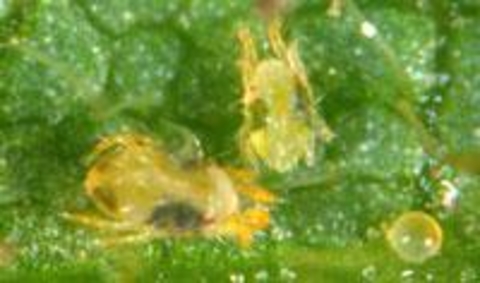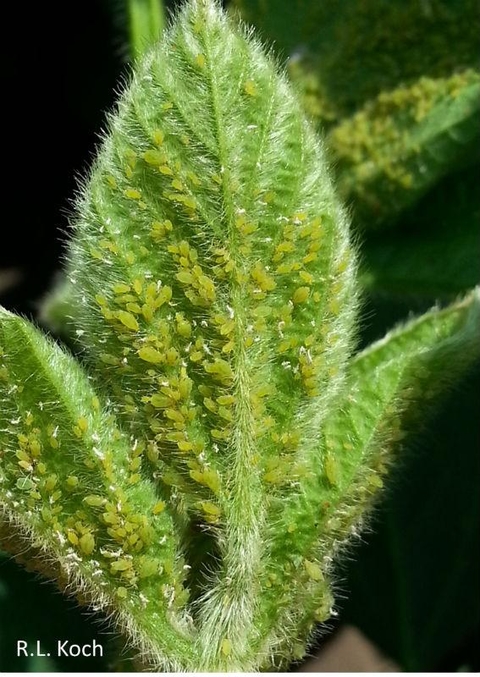Insecticide (and miticide) resistance is a heritable decrease in a pest population's susceptibility to a pesticide, meaning the genetics are passed from generation to generation.
As pest populations become less susceptible (i.e., more resistant) to a pesticide, that pesticide’s utility becomes less and less effective. It can reach a point where the pesticide and potentially other related pesticides may become effectively lost as tools for managing that pest.
Since the invasion of soybean aphid in 2000, using foliar insecticides on soybean has greatly increased. In addition, when crop values are high, it stimulates increased adoption of seed treatments and prophylactic foliar treatments.
If not well-managed, this overall increased insecticide use in soybean favors the development of insecticide resistance in pests.
Insecticide resistance management strategies
Insecticide resistance management (IRM) is a collection of strategies to prevent or slow the development of insecticide resistance to prolong the utility of pesticides as management tools.
IRM strategies recommended for insect and mite pests in Minnesota soybean include the following.
Integrate multiple management tactics (e.g., pest-resistant varieties, biological control, crop rotation) to discourage pest outbreaks.
Regularly scout, and base insecticide applications on economic (action) thresholds.
Economic threshold for soybean aphid
Through R5 soybean, treat when all three conditions are true:
Populations are increasing.
The majority (at least 80 percent) of plants are infested.
Average aphid counts exceed 250 aphids per plant.
University research continues to support the above mentioned threshold for soybean aphid. Using the threshold will reduce:
-
Risk of the target pest’s resurgence.
-
Replacement by secondary pests.
-
Adverse impacts on natural enemies and pollinators.
-
Development of pest resistance and unnecessary costs.
Multi-state report: Continued validity of soybean aphid threshold
Follow the product label directions and use labeled rates of insecticides.
Alternate insecticide modes of action (groups) to delay resistance. For newer products, the label lists the insecticide group. Table 1 shows insecticide groups to assist in selection of insecticides. You can find further information on the Insecticide Resistance Action Committee (IRAC) website.
For pests with more than one generation per year, alternate insecticide modes of action being used within the year. For less-mobile pests with one generation per year, alternate modes of action between years.
In terms of exposure to insecticides, think of the pest complex as a whole. An insecticide application targeted at one pest will also expose other pests present to the insecticide.
Example: If a foliar application of an organophosphate (group 1B) insecticide is applied to a field that has exceeded the economic threshold for soybean aphid (250 aphids per plant), the insecticide used for a subsequent treatment for soybean aphids or any other pest should not contain an insecticide from group 1.
Though insecticide mixtures (formulated mixtures or tank mixtures) may be effective for pest suppression, alternation (i.e., the use one after another) of insecticide modes of action is generally more effective for insecticide resistance management.
Identifying potential resistance
Before assuming resistance, rule out these factors:
Misapplication of insecticide (incorrect insecticide or rate, poor coverage).
Unfavorable weather (wind, rain, temperature). For example, some pyrethroids can be less effective at high temperatures.
Improper timing of application (susceptibility of life stage present).
Recolonization by the pest.
If you still suspect insecticide resistance, report insecticide failure or contact Extension.
Insecticides and treatments
The widespread, prophylactic use of systemic insecticidal seed treatments (e.g., neonicotinoids) across many acres is counter to the philosophy of integrated pest management, regardless of pest risk. It may pose a risk for developing pest resistance to these insecticides, as well as other environmental concerns.
Using systemic insecticidal seed treatments is an effective pest management tool for some pest situations. In particular, use these treatments in situations with high risk for economically damaging populations of seed- and seedling-feeding insects.
Multi-state report on continued validity of soybean aphid threshold.
While there are many products, they represent only three insecticide modes of action. Specifically:
-
Group 1 = Acetylcholinesterase inhibitors.
-
Group 3 = Sodium channel modulators.
-
Group 4 = Nicotinic acetylcholine receptor agonists.
Always follow label instructions.
Table 1: Representative soybean aphid insecticides (foliar formulations)
| Group | Common name | Trade names: Individual active ingredient | Trade names: Formulated mixtures |
|---|---|---|---|
| 1A | methomyl | Lannate | -- |
| 1A | acephate | Acephate | -- |
| 1B | dimethoate | -- | |
| 3A | alpha-cypermethrin | Fastac | -- |
| 3A | beta-cyfluthrin | Baythroid | Leverage |
| 3A | bifenthrin | Tundra, Sniper, Fanfare, Discipline, Brigade, Bifenture | Justice, Brigadier, Swagger, Skyraider, Hero, Steed, Triple Crown |
| 3A | cyfluthrin | Tombstone | -- |
| 3A | deltamethrin | Delta Gold, Battalion | -- |
| 3A | esfenvalerate | Asana XL, Adjourn | -- |
| 3A | gamma-cyhalothrin | Declare, Proaxis | -- |
| 3A | lambda-cyhalothrin | Warrior II, Grizzly Z, LambdaStar, Lambda-Cy, Lamcap, Province, Silencer VC, Taiga Z | Besiege, Double Take, Endigo, Seeker |
| 3A | permethrin | Arctic | -- |
| 3A | zeta-cypermethrin | Mustang Maxx, Respect | Hero, Steed, Triple Crown |
| 4A | acetamiprid | -- | Justice |
| 4A | clothianidin | -- | Belay |
| 4A | imidacloprid | Prey, Admire Pro, ADAMA Alias, Wrangler, Nuprid, Sherpa | Leverage, Brigadier, Swagger, Skyraider, Triple Crown |
| 4A | thiamethoxam | -- | Endigo |
Reviewed in 2022



